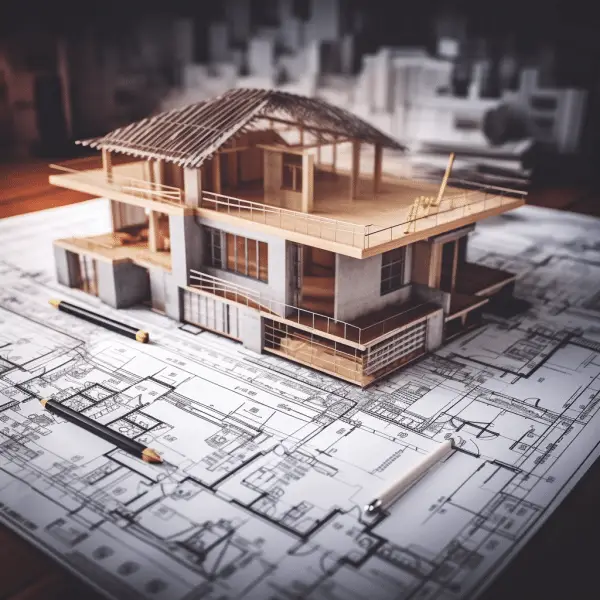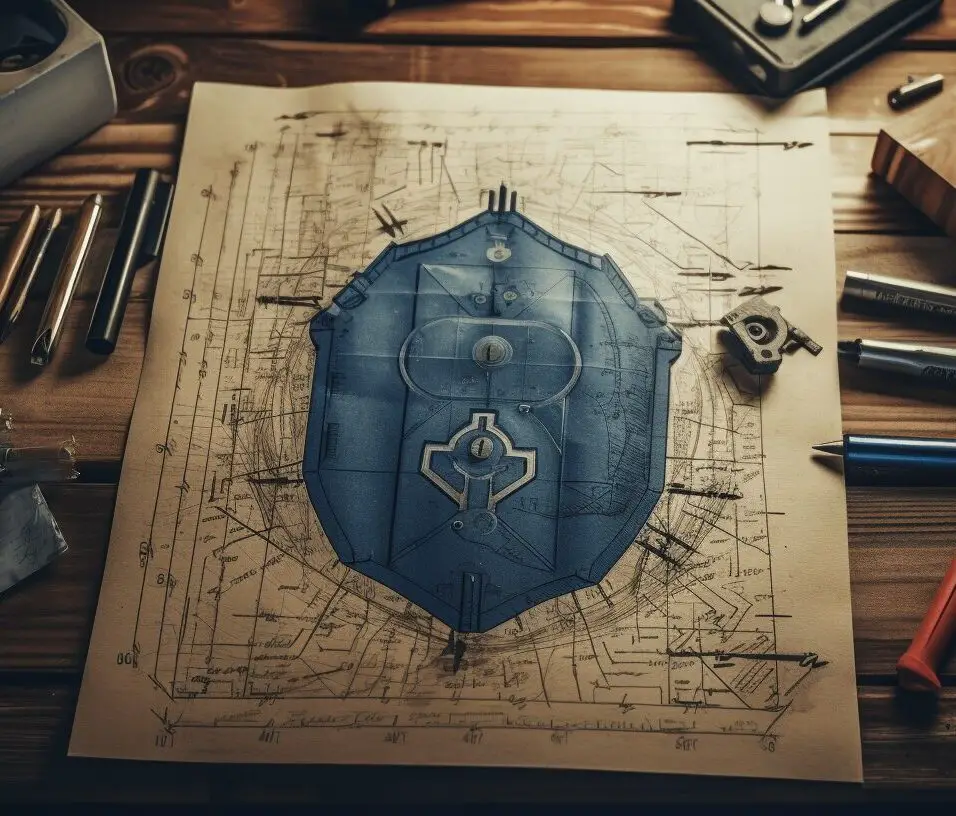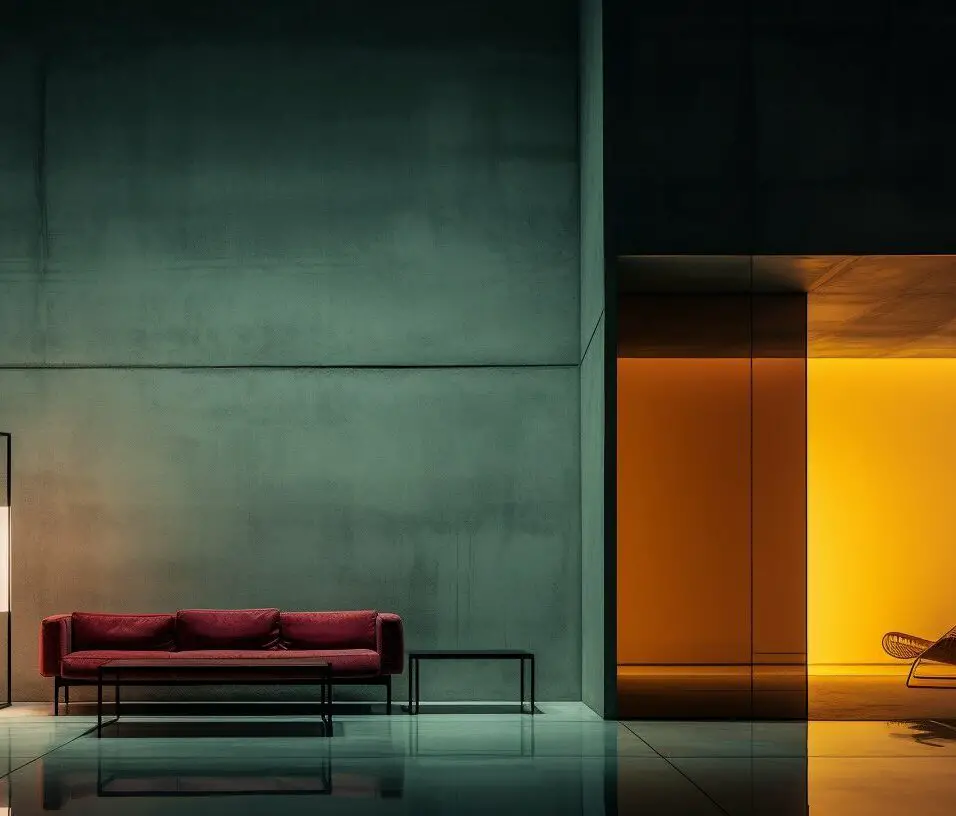Navigating Architect Costs: Factors Affecting Hiring Expenses
If you’re considering hiring an architect, it’s essential to understand the cost involved and the factors that influence it. From the architect’s expertise level to the type of project and fee structure, there are various elements that can impact the overall cost. Let’s explore the pricing factors and shed light on the average cost of hiring an architect in the U.S.
Key Takeaways:
- The cost of hiring an architect can vary based on factors such as expertise level, fee structure, project type, and level of involvement.
- Architectural fees for residential projects typically range from 5% to 20% of construction costs.
- Architects may charge different rates depending on their skill and experience level.
- Fee structures can include hourly rates, square foot pricing, percentage of construction costs, fixed rates, or combinations of these models.
- The average cost to hire an architect for designing house plans is $5,000 to $60,000.
Factors that affect architect cost
Several factors come into play when determining the cost of hiring an architect. The architect’s level of expertise is one such factor that can influence the cost. As with any profession, architects with a higher skill level and more experience generally command higher fees. Their expertise allows them to provide more innovative and high-quality designs, which can be reflected in their pricing. However, it is important to note that the architect’s level of expertise may not always correlate directly with higher fees. Some architects may charge lower rates to attract new clients or to gain experience in a particular type of project.
Architects utilize hourly, square foot, percentage of building expenses, fixed, and combinations of these fee systems. Each pricing system has pros and cons, and the architect’s preference and project demands may determine the structure. An hourly fee may be better for short, simple projects than a proportion of construction costs for bigger, more complex ones.
The project type and architect involvement might also effect pricing. New build projects require more planning and coordination than renovating projects, which may increase prices. Architects who are involved in the project from initial design to construction administration may charge more than those who merely design.
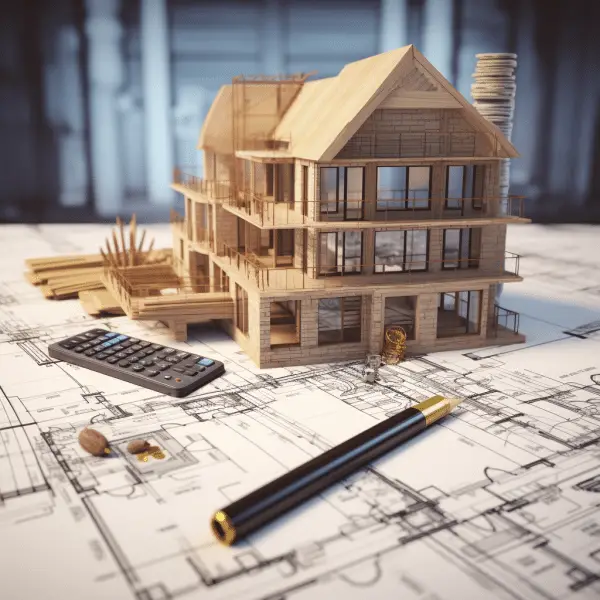
Table 1: Factors Affecting Architect Cost
| Factors | Description |
|---|---|
| Expertise Level | The architect’s skill level and experience |
| Fee Structure | The method used to calculate the architect’s fees |
| Type of Project | Whether it is a new build or a remodel |
| Level of Involvement | The extent to which the architect is involved in the project |
| Geographic Location | The location of the project, which can affect the cost of living and business expenses of the architect |
The geographic location of the project can also impact architect costs. Architects practicing in high-cost urban areas may charge higher fees compared to those in suburban or rural areas. This is due to the higher cost of living and business expenses in major cities. It is important to consider these geographic factors when budgeting for architectural services.
Ultimately, the cost of hiring an architect is influenced by several interrelated factors. It is important to carefully consider the architect’s expertise level, fee structure, type of project, level of involvement, and geographic location when budgeting for architectural services. By understanding these factors and finding the right architect for your project, you can ensure a successful outcome that aligns with your vision and budget.
Architect’s fee structure
Clients can choose the appropriate cost structure for their project and budget from architects. These fees can be hourly, square foot, percentage of construction costs, fixed, or a mix. Before choosing, clients should grasp the pros and downsides of each cost structure.
Hourly rates are utilized for smaller projects or jobs with limited scope. The architect charges a set hourly cost for project work. Fees depend on the architect’s experience and expertise.
New construction projects often use square foot pricing, where the architect costs per square foot. Since clients may determine architect costs based on project size, this fee structure streamlines cost estimation.
A percentage of construction expenditures is another popular charge structure. This methodology calculates architect fees as a percentage of building costs. The amount ranges from 5% to 20% for residential developments, depending on complexity and scale. This pricing structure matches architect pay with project budget.
| Fee Structure | Description | Pros | Cons |
|---|---|---|---|
| Hourly Rate | Charging an agreed-upon hourly rate for the time spent on the project | Provides flexibility for smaller projects or tasks | Difficult for clients to estimate total costs |
| Square Foot Pricing | Charging a set price per square foot of the construction area | Simplifies cost estimation for clients | May not accurately reflect the complexity of the project |
| Percentage of Construction Costs | Charging a percentage of the total construction costs | Aligns architect’s compensation with overall project budget | Can lead to higher fees for larger-scale projects |
Some architects may also offer fixed rates for certain services or a combination of different fee structures tailored to the specific project. It’s important for clients to discuss and negotiate the fee structure with their chosen architect to ensure clarity and transparency in the financial aspect of the project.
Architectural Fees for Residential Projects
When it comes to residential projects, architectural fees are typically calculated based on a percentage of the construction costs. This is a common fee structure used by architects, as it allows for flexibility and ensures that the architect is adequately compensated for their expertise and services. The percentage can vary depending on the complexity and scale of the project, but it generally ranges from 5% to 20% of the construction costs.
Architectural fees are an important consideration when budgeting for a residential construction or renovation project. It’s essential to factor in these costs to ensure that you have a realistic budget in place and can afford the services of a qualified architect. The fees cover various aspects of the architectural process, including design development, coordination with contractors and engineers, obtaining permits, and overseeing the construction process.
| Architectural Fee Structure | Percentage Range |
|---|---|
| Hourly Rate | Varies (typically $100 – $250) |
| Square Foot | Varies |
| Percentage of Construction Costs | 5% – 20% |
| Fixed Rate | Varies |
| Combination | Varies |
Architects may also charge hourly rates, fixed rates, or per square foot costs for their services. These fee structures are more common for specific tasks or smaller projects. Hourly rates can vary depending on the architect’s experience and location, while square foot pricing is often used for simpler projects where the design scope is relatively straightforward.
It’s important to remember that architectural fees are an investment in the expertise and creativity of an architect. Hiring an architect can bring immense value to your residential project, ensuring that it is well-designed, functional, and meets your specific needs. The guidance and expertise of an architect can help navigate complex building codes, overcome design challenges, and create a space that truly reflects your vision and lifestyle.
Average cost to hire an architect
Architectural fees for house plans range from $5,000 to $60,000. This cost depends on numerous things, so be aware. The final cost depends on the architect’s expertise, fee structure, type of project, level of involvement, geographic location, and new build or remodel status.
Architects’ rates vary by competence and experience. The price structure can be hourly, square foot, percentage of building costs, set, or a mix of these. In residential projects, architectural fees average 5% to 20% of construction expenditures.
The second source reports that residential architect fees can be 5% to 20% of construction expenditures, with hourly rates of $100 to $250. The third source proposes architects charge by percentage of construction costs, fixed charges, hourly rates, or by square foot.
These considerations and precise architect quotations should be considered while budgeting for architectural services. You can make an informed decision and ensure your project meets your financial goals by understanding the pricing range and price structures.
| Architectural Fee Structure | Price Range |
|---|---|
| Hourly Rate | $100 – $250 |
| Square Foot Pricing | Varies |
| Percentage of Construction Costs | 5% – 20% |
| Fixed Rate | Depends on project complexity |
Reasons to Hire an Architect
In some cases, hiring an architect may ensure your project is well-designed and fits your goals. In case of house issues, restricted space, or building decisions, an architect can offer advice and creative solutions.
An architect can examine your home’s faults and propose creative solutions. They can give new ideas for maximizing space, improving usefulness, and beautifying your home.
For small projects, an architect’s design skills can be crucial. Smart design may increase functionality and provide a sense of space in the available space.
An architect can also help you choose a structure. They can help you choose materials, finishes, and systems that fit your vision, budget, and sustainability and durability.
Local building codes are also familiar to architects. They can save you time and problems by ensuring your project meets standards and obtains permissions.
When remodeling a unique or historic home, an architect’s experience is crucial. They can preserve the building’s heritage while adding modern facilities and design elements that match the look.
An architect can be a good investment even on a budget. They can help you prioritize your goals, find cost-effective solutions, and avoid costly planning or design blunders.
To conclude, an architect can fix problems with your house, optimize space, advise you on building choices, navigate local building authorities, remodel unique or historic homes, and keep your project on budget. By hiring an architect, you can ensure your project is well-executed, functional, and attractive.
Finding the Right Architect
Finding the right architect can have a significant impact on the success of your project, so it’s crucial to approach the search process thoughtfully. With countless options available, it can be overwhelming to know where to start. However, by following a few key steps, you can streamline your search and find an architect who aligns with your vision and goals.
One useful strategy is to explore home design magazines and websites for inspiration. These platforms showcase the work of talented architects and can give you a sense of their design styles and capabilities. Take note of any projects that resonate with your own vision, and consider reaching out to the architects behind them.
Another valuable resource is The American Institute of Architects (AIA). This professional organization represents architects across the United States and provides a reliable source of referrals. Local chapters of the AIA can offer recommendations based on your specific location and project requirements. It’s worth reaching out to them for guidance and potential architect recommendations.
Interviews and Design Philosophy
Once you have a list of potential architects, it’s important to conduct interviews to assess their design philosophy and process. This will give you a better understanding of how they approach projects and whether their style and approach align with your own vision.
During the interview, ask about their previous experience with projects similar to yours, and request to see examples of their work. Take the time to discuss your project in detail, outlining your goals, budget, and timeline. This will help you gauge the architect’s understanding and enthusiasm for your specific project.
Remember, finding the right architect is not just about their technical abilities but also about establishing a good rapport and feeling confident in their ability to bring your vision to life. By carefully considering these factors and conducting thorough research, you can find the architect who will be the perfect fit for your project.
| Key Points | Summary |
|---|---|
| Explore home design magazines and websites | Get inspiration and connect with architects |
| Reach out to local chapters of The American Institute of Architects | Receive recommendations based on location |
| Conduct interviews to assess design philosophy and process | Gauge alignment with your vision and goals |
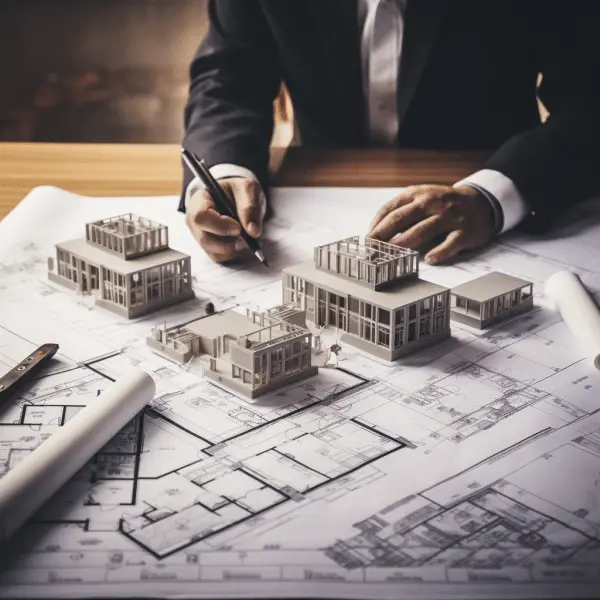
Conclusion
Hiring an architect for your US building or remodeling project requires knowledge of architect fees and their aspects.
Consider several pricing criteria when calculating architect charges. The national average for architect fees is $5,980, ranging from $2,175 to $10,480. These expenses depend on the architect’s experience, fee structure, project kind, amount of involvement, geographic location, and new build or remodel status.
Architects’ rates vary by competence and experience. Hourly rates, square foot prices, building cost percentages, set rates, and combinations of these can be used. Residential architectural fees average 5%–20% of construction expenditures.
Finding the proper architect requires investigation. Find inspiration in house design periodicals and websites, ask local AIA chapters for suggestions, and interview possible architects to assess their design philosophy and methodology. Finding an architect that shares your vision and aspirations is crucial to success.
FAQ
Q: How much does it cost to hire an architect?
A: The cost of hiring an architect can vary depending on factors such as the architect’s expertise level, fee structure, type of project, level of involvement, geographic location, and whether it’s a new build or a remodel. The typical cost range is $2,175 to $10,480, with a national average of $5,980.
Q: What factors affect the cost of hiring an architect?
A: The cost of hiring an architect can be influenced by the architect’s expertise level, fee structure, type of project (new build or remodel), level of involvement, and geographic location. These factors should be considered when budgeting for architectural services.
Q: How do architects determine their fees?
A: Architects may charge different rates depending on their skill and experience level. The fee structure can be hourly, square foot, percentage of construction costs, fixed rate, or a combination. It is important to discuss the fee structure with the architect to understand how they determine their fees and what is included.
Q: What are the architectural fees for residential projects?
A: Architectural fees for residential projects are typically 5% to 20% of the construction costs. The exact percentage may vary depending on the complexity of the project and the services required. It is important to consider these fees when planning a residential construction or renovation project.
Q: What is the average cost to hire an architect to design house plans?
A: The average cost to hire an architect to design house plans is $5,000 to $60,000. The cost can vary depending on factors such as the size and complexity of the project, the architect’s experience, and the location. It is important to budget for architectural services during the planning phase.
Q: When should I hire an architect?
A: It is recommended to hire an architect in situations where there are problems with the existing house, limited space, uncertainty in making building choices, requirements from local building authorities, remodeling unique or historic homes, or when working on a budget. An architect can provide expertise and creative solutions in these scenarios.
Q: How can I find the right architect for my project?
A: To find the right architect for your project, you can check home design magazines and websites for inspiration, contact local chapters of The American Institute of Architects for recommendations, and conduct interviews with potential architects. It is important to assess their design philosophy and process to ensure they align with your project goals.



